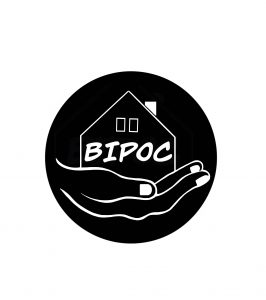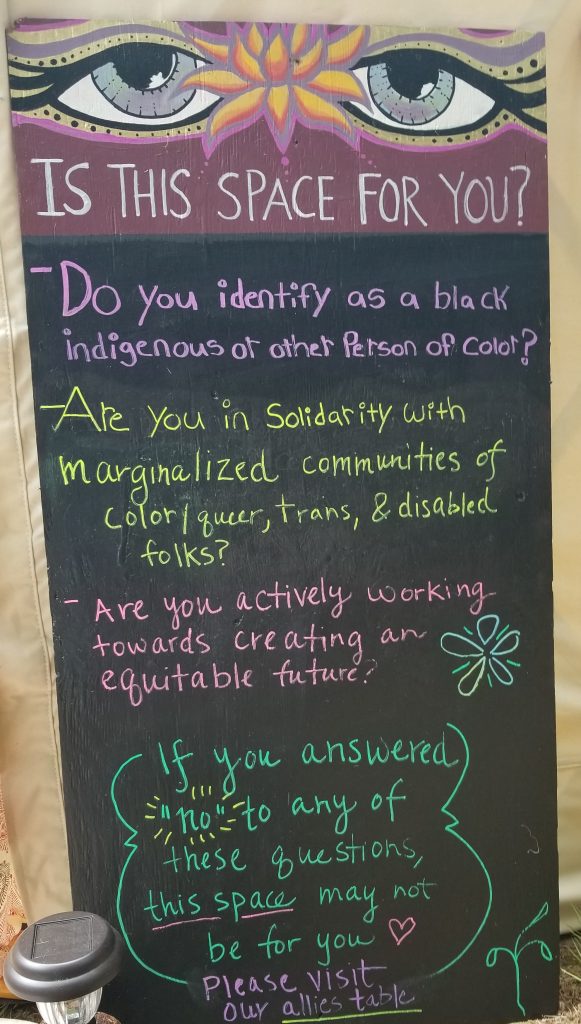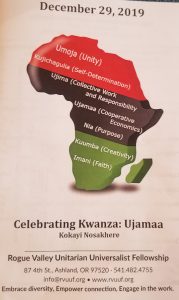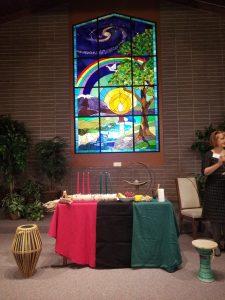Ashland Black, Indigenous, People of Color (BIPoC) Sanctuary
[UPDATE MARCH 15, 2024]
In January 2020, with a $500 check, the Ashland BIPoC Sanctuary and Rogue Valley Unitarian Universalists (RVUUF) began a beautiful journey. Recognizing the condition the European American community is in, it was determined that a space was needed for Black/Brown/Indigenous and Persons of Color could go and relax from the tension of being under constant scrutiny and harassment.
RVUUF graciously accepted the responsibility of becoming the Sanctuary’s fiscal sponsor. With a staff person, who could act as bookkeeper and communicate with the Sanctuary, the relationship built trust within the BIPoC community. Over the course of three years, the Sanctuary has grown in outward capacity to provide a weekly service to the Ashland community.
During this growth period, Ashland’s community engagements shifted. While regularly hostile to diversity, the national attention brought by controversy at OSF increased the cost of being BIPoC in Ashland. To that end, the Sanctuary seeks to grow to another level.
In 2024, we changed our name. We are now the Sunrise Village Sanctuary! Ashland used to be a sundown town and desire to set intentions towards the future we all want to see.
As a self standing non-profit, we’re resolved to continue providing services in the Rogue Valley and aim to add many more. For those who wish to support our efforts, please use this link:
Venmo: https://venmo.com/u/Sunrise-
To donate directly to our Rogue Valley Credit Union account please email us at pv.sunrisevillagesanctuary@
Be reassured that the Sunrise Village Sanctuary is here to support the change we all know is intellectually, spiritually and ethically necessary.
Kokayi Nosakhere
President of the Ashland BIPoC Sanctuary
BIPoc Sanctuary’s Origins and Mission
The Ashland BIPoC Sanctuary is a community organization sponsored by RVUUF. Brought to life by Kokayi Nosakhere in 2019, and led by Lisa Ebony since January of 2022, the Sanctuary has grown to be a constant and reliable place for Southern Oregon’s BIPoC residents to gather, share resources, create resources, and experience JOY. Here we share a small portion of Kokayi’s vision for the Ashland BIPoC Sanctuary:
 Why? Why is a BIPOC* Sanctuary needed in Ashland?
Why? Why is a BIPOC* Sanctuary needed in Ashland?
Ashland views itself as a collection of progress-minded individuals, seeking, as Mahatma Gandhi’s autobiography suggests, to “experiment with truth,” and establish meaningful connections through human activity of combining thought, breath and emotion.
Consequently, the majority of Ashland residents do not experience racial tensions intense enough to believe a NAACP-style political organization is needed to ensure the rights of the Black people who live in the Rogue Valley. Yes, incidents pf racism do occur, however, the racial animosity present appears to be of such quality, that interpersonal skills can easily address them. The existence of non-profit organizations like Unete soothe the fears of White residents, because if the Latinx community was truly in fear, an organization would not exist. It existence is proof of the progressive nature of the Valley.
Black persons hear the following argument repeatedly, “Sometimes humanity is messy,” a smiling white voice opines. The spiritual bypassing is an amazing display of mental gymnastics.
“Racism is not real. Racism remains with us because we give it so much energy. The content of the conflict is secondary to the existence of the conflict. Resolve the issue inside of the individuals and the conflict is resolved. The pivot point is intention. Focus on the problem and the problem intensifies. Focus on the solution and the solution will manifest,” the smile says.
So, answering the question of WHY a structured “safe space” is needed, is essential.
Persons of color in Ashland do not feel safe. They report numerous incidences where they do not feel their Rogue Valley experience matches the progressive vision of Ashland residents. Because little value is gained by vigorously debating this difference, the latest solutionary project is to experiment with the creation of healing spaces within American society where PoC can recover.
The Nature of Recovery
What are we PoC recovering from? PoC are recovering from having to continuously answer questions about racism. We are asked to explain what a “microaggression” is. Or explain a slang word. Or share an intimate family recipe at a work potluck.
We are asked to explain what “emotional labor” is when we become tired of explaining why. Or how PoC are not always using the race card and claiming victim stance when speaking on their lived experiences.

Inside the 2019 Beloved Music Festival, Oregon-based BIPoC experimented with a “sanctuary” space. Despite hippie culture and positive vibrations, white-skinned persons were not permitted inside that space.
Why is this not segregation? Self-segregation?
The answer is: Because segregation is an act of power by state-sponsored institutions. State and local law was used to enforce segregation practices. This is not true for the creation of a (separate) healing space.
To depart from American socialization, our white-skinned family and friends decided to experiment with the meaning of ally. Instead of standing with PoC, they stood instead of we PoC. When white-skinned Beloved attendees, in their confusion, asked, “Why?” The allies provided the answer, not us.
The sanctuary was a place to take a break and free up the psychic energy used to always serve a social racialized standard our white friends and family members report not having to meet…
The need in Southern Oregon for a BIPoC Sanctuary has not changed. In fact, racial tensions are still high in our country with yet another police execution of Patrick Lyoya just last week. What IS evolving in Southern Oregon is the understanding of WHY. We are seeing more and more clearly the ways in which those of us in the BIPoC Community are struggling through interactions with white bodied people who don’t know how to accept things they aren’t personally experiencing. We are also seeing more and more clearly how beneficial it is and has been for our Community to have safe spaces to gather and process. When each of us are given the space to be our most authentic and vulnerable selves, we are able to show up in the world FULL with something significant to give back.
Over the past three years, Southern Oregon (and beyond!) has come together to show support for the BIPoC Sanctuary in a way that has truly supported our community’s health and safety. More work needs to be done, and it will require us all continuing to show up in the ways that are available to and comfortable for us, but the support, respect and encouragement we have received from those working with us this far has been a true gift during a time of crippling uncertainty. Many families have had bills covered, needs met, and transportation provided in times of crisis. This safety net came directly from our donors, and our gratitude can not be overstated.
In stepping into leadership at the beginning of 2022, it became immediately apparent to Lisa Ebony that between the growth of the BIPoC Sanctuary Community and the need for safe, in-person socialization, the Sanctuary was going to need to increase its presence, its funding, and its impact. The members of The BIPoC Sanctuary have come together to discuss what we need from and would like to offer to Southern Oregon, and have an incredible agenda for the next year. It is our hope you will join us in the ways we need, as true allies.
There is always a fine line in the act of healing, between doing for self and engaging proactively and positively in our community. We have the vision and commitment to maintaining our safe spaces and activities; we have the desire to get into the community and give back from cups that are FULL. What we still need and hope to receive from our community at large is the support to make all these things happen.
If you are inspired by the concept animating the BIPOC sanctuary, please feel free to add your name to the BIPoC mailing list, and learn more about ways to engage with and support them. Amplify your support with others. Many hands create the most impactful change.
Our deepest gratitude for all of your support! The Sanctuary is making moves toward a more equitable and safe Southern Oregon every day, and it is truly thanks to you. Your generosity and willingness to help the Black and Brown bodies of Southern Oregon helps create the safe spaces necessary for healing to begin. We appreciate you and look forward to the many ways we can come together in the future.
In 2019, RVUUF hosted Kokayi’s presentation of the 4th Night of Kwanzaa.


